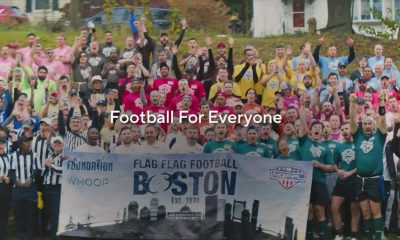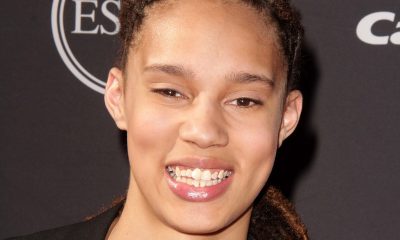Sports
U.S. professional sports called the ‘last closet’
40 years after Stonewall, no ‘out’ player in major league baseball, football, hockey

Brittney Griner, seen here accepting the Wade Trophy, came out as a lesbian but didn’t receive a lot of media attention, even though she is recognized as the best woman basketball player to enter the WNBA draft in 2013. (Photo by Sphilbrick; courtesy Wikimedia Commons)
LGBT sports enthusiasts were thrilled earlier this year when professional basketball player Jason Collins and pro soccer player Robbie Rogers came out as gay, becoming the first two out gay men to emerge as current players in the professional leagues for the two sports.
Around the same time, Brittney Griner, the top-rated 2013 college basketball player in the Women’s National Basketball Association (WNBA) draft, came out as a lesbian. Her coming out made no difference to the Phoenix Mercury WNBA team, which quickly signed her on as a player.
The decision by Collins, Rogers, and Griner to disclose their sexual orientation followed coming out stories last year of another women’s pro basketball player, Seimone Augustus, and a women’s pro soccer player, Megan Rapinoe.
FIND MORE OF THE WASHINGTON BLADE SPORTS ISSUE HERE.
While these developments are viewed as encouraging signs by LGBT sports fans and activists, they come at a time when no open gays have ever emerged as players in three of the nation’s most popular professional sports — baseball, football and ice hockey. And though the NBA’s Collins came out four months ago, he remains a free agent.
No male professional golfer has ever come out as gay anywhere in the world and just one pro tennis player who is male has ever come out, according to Cyd Zeigler, editor and publisher of OutSports, a widely read online publication covering LGBT people in sports.
“People call it the last closet. And I think that’s what it is,” Zeigler told the Blade in discussing the lack of LGBT people in professional sports. “I think homophobia for decades has been more entrenched in sports than it has in most other areas in our culture,” he said.
“It starts when these kids are young. And they’re five years old and 10 years old and playing sports and the coach calls them a faggot and tells them not to be a sissy and this idea that being a faggot is less than being a man,” he said. “It starts there.”
Zeigler and other experts in the field of gays in sports say they are optimistic that cultural and political changes that opened the way for LGBT rights advances in recent years, including the approval of same-sex marriage in a growing number of states, will soon spill over into the realm of professional sports.
Forty-three years after the Stonewall riots in New York sparked the modern LGBT rights movement, LGBT activists say they are hopeful that baseball, football and hockey along with other professional sports will soon join the ranks of other professions in becoming more welcoming for LGBT people.
Zeigler said nearly all professional sports leagues have policies that ban discrimination based on sexual orientation along with other categories such as race, religion and ethnicity.
Earlier this year, at the request of New York State Attorney General Eric Schneiderman, the National Football League and Major League Baseball agreed to strengthen their non-discrimination policies pertaining to sexual orientation.
In a statement released in April, Schneiderman said he pushed for the strengthened policies after his office learned of complaints by at least three prospective NFL players that they were asked questions about their sexual orientation at the league’s recruitment scouting meeting held in February in Indianapolis.
“According to one prospective player, representatives of NFL teams asked prospects if they had a girlfriend, were married, or liked girls,” a statement released in April by Schneiderman’s office says.

The NFL and Major League Baseball adopted non-discrimination policies on sexual orientation in 2011 as part of collective bargaining agreements with the NFL and MLB and their respective player’s associations. (Washington Blade photo by Michael Key)
The statement and a follow-up statement released in July says both the NFL and Major League Baseball adopted their initial non-discrimination policies on sexual orientation in 2011 as part of collective bargaining agreements with the NFL and MLB and their respective player’s associations, which act as player unions.
The statements say that in response to Schneiderman’s request, the NFL and MLB agreed to adopt a workplace code of conduct specifically addressing sexual orientation discrimination and to post the policy document in all team locker rooms among other places.
“Both on the field and away from it, Major League Baseball has a zero-tolerance policy for harassment and discrimination based on sexual orientation,” MLB Commissioner Bud Selig said in a statement related to the code of conduct document.
It couldn’t immediately be determined whether the new non-discrimination policies would encourage gay baseball or football players to come out. But experts familiar with LGBT people in sports say factors other than homophobia and anti-LGBT bias may be playing a role in discouraging LGBT people from coming out in professional sports.
“I think the athletes themselves are ready to have an openly gay teammate,” said Patricia Griffin, Professor Emerita in Social Justice Education at the University of Massachusetts in Amherst.
Griffin, a former swimming coach and author of the book “Strong Women, Deep Closets: Lesbians and Homophobia in Sports,” told the Blade that concern over media attention may be keeping some LGBT athletes from coming out.
“I think one of the things that keeps athletes in the closet is not necessarily that they’re afraid of the homophobia of their teammates, but that it’s still such a news story, especially for the men,” Griffin said. “You have to be prepared to deal with all of the media attention. And I think there are a lot of gay athletes and that’s not what they want to do,” she said.
“They would like to be out. They want to be out. But they don’t want to have to deal with the attending media crush as well as probably requests from every gay organization in the world to be a spokesperson and so on,” she said.
Zeigler said he, too, believes reasons other than anti-LGBT bias have prompted many LGBT athletes in professional sports to stay in the closet. He noted that in the NFL, the average career often ends after three and a half years. The average baseball and hockey career is likely to be longer, but most players are ready for retirement by their late 30s, he said
“These guys from high school are working essentially full-time jobs and going to school,” he said. “And a lot of them say they don’t have time to explore their sexual orientation. Their idea of coming out in the middle of the pressure of trying to make a college squad, trying to get playing time, trying to make an NFL squad, trying to get a good contract” is not something that appeals to them, he said.
“So coming out is a complication, an unnecessary complication for some of them,” said Zeigler.
Robert McGarry, senior director of education and youth programs for the Gay, Lesbian & Straight Education Network (GLSEN), said his organization is working with public schools and teachers, including physical education teachers, to curtail anti-LGBT bias among youth.
“What you see at the pro level really starts in kindergarten and on the playground on recess time,” McGarry said. “The kind of exclusion of kids who step outside of what society expects of their gender fuels that. What fuels it also is educators not addressing anti-LGBT language and bias.”
He said GLSEN retained Patricia Griffin to develop a GLSEN sports project called Changing the Game, which is designed to address homophobia and trans phobia in school sports programs from kindergarten to the 12th grade.
“We’ve been doing training across the country with mostly high school coaches and physical education teachers who seem very receptive and anxious to have this kind of training because it’s not something that they get in their preparation and they don’t really know what to do,” he said. “So we’re trying to fill that gap.”
Griffin said educational programs like GLSEN’s sports project and the changing attitudes throughout the country on LGBT equality will soon lead to more openly LGBT professional sports players, including players in the NFL and MLB.
“I think one of these days there’s going to be a quarterback from some college football team, Division 1, who gets recruited up high in the draft and he’s going to come in to the NFL as an out gay man,” Griffin said. “I actually think that’s more likely to happen than having an established star come out after he’s been playing for a while.”
Added Griffin, “They never knew what it was like to be ‘in,’” she said of the up and coming young athletes. “They are out and that’s how they live their lives. That alone is going to change the face of sports in the next few years.”
McGarry of GLSEN cautioned that although it will help the cause of LGBT people in sports if more big name stars come out, that alone won’t address the underlying cause of homophobia in sports.
“It’s a shame that everybody is sort of waiting for the first NFL player to come out,” he said. “There are many people who think that’s going to be the great solution – to have a football player come out of the closet. I think there’s a lot more work to be done.”
D.C. Police Sgt. Brett Parson, the gay former head of the department’s Gay & Lesbian Liaison Unit, is a longtime amateur ice hockey player and former referee with the National Hockey League who says he witnessed firsthand the culture of professional hockey players.
“While we’ve come a long way, football, basketball, baseball, ice hockey – those sports still have the machismo that inhibits people from coming out and disclosing they’re gay for fear of being ostracized,” Parson said.
“I think we’re maybe not a generation away but we’re still a few years away before more people feel comfortable doing that,” he said.
Griffin said more women’s professional athletes have already come out than male professional athletes, but this often goes unnoticed because historically the public and the sports media pay more attention to men in sports.
She noted that Brittney Griner didn’t receive a lot of media attention when she came out this year, even though she is recognized as the best woman basketball player to enter the WNBA draft in 2013.
“Part of that is because it’s sort of like a weird kind of sexism, where we always think men’s sports are more important and we pay more attention to men’s sports,” she said. “So it makes sense that if a gay man comes out in men’s sports we pay more attention.”
According to Griffin, the less-noticed coming out by Griner may be the better path for all LGBT athletes going forward.
“With women it’s not such a surprise because people assume that there are lesbians in sports,” she said. “But when she came out it wasn’t like a giant announcement. She was just very matter of fact. It’s who I am. I’m proud of who I am and, you know, let’s move on,” said Griffin.
“And I think that’s going to be the future of more athletes who come out rather than having this be this giant, traumatic announcement that they make and feel like they’re risking their career by coming out,” she said.
Sports
Brittney Griner, wife expecting first child
WNBA star released from Russian gulag in December 2022
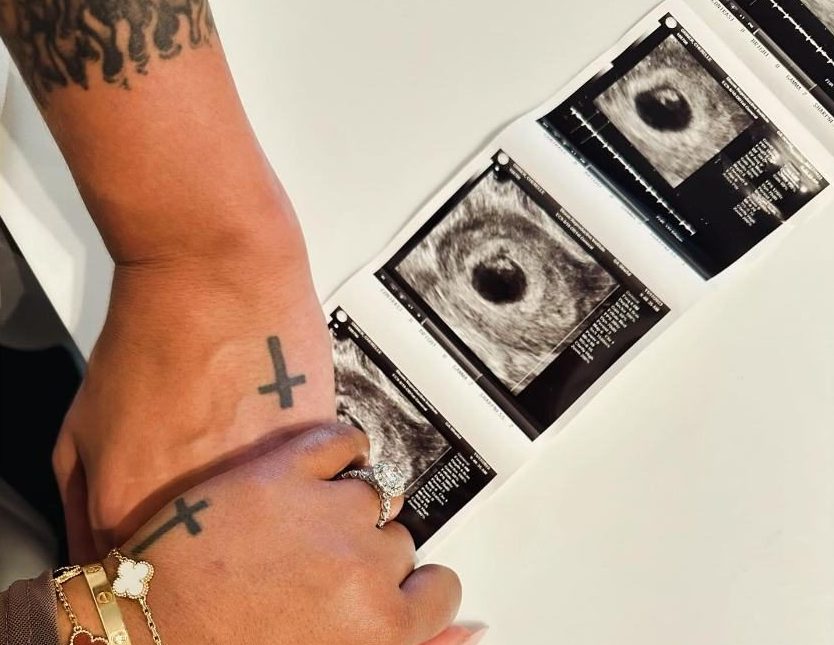
One year after returning to the WNBA after her release from a Russian gulag and declaring, “I’m never playing overseas again,” Phoenix Mercury star Brittney Griner and her wife announced they have something even bigger coming up this summer.
Cherelle, 31, and Brittney, 33, are expecting their first child in July. The couple shared the news with their 715,000 followers on Instagram.
“Can’t believe we’re less than three months away from meeting our favorite human being,” the caption read, with the hashtag, #BabyGrinerComingSoon and #July2024.
Griner returned to the U.S. in December 2022 in a prisoner swap, more than nine months after being arrested in Moscow for possession of vape cartridges containing prescription cannabis.
In April 2023, at her first news conference following her release, the two-time Olympic gold medalist made only one exception to her vow to never play overseas again: To return to the Summer Olympic Games, which will be played in Paris starting in July, the same month “Baby Griner” is due. “The only time I would want to would be to represent the USA,” she said last year.
Given that the unrestricted free agent is on the roster of both Team USA and her WNBA team, it’s not immediately clear where Griner will be when their first child arrives.
The Griners purchased their “forever home” in Phoenix just last year.
“Phoenix is home,” Griner said at the Mercury’s end-of-season media day, according to ESPN. “Me and my wife literally just got a place. This is it.”
As the Los Angeles Blade reported last December, Griner is working with Good Morning America anchor Robin Roberts — like Griner, a married lesbian — on an ESPN television documentary as well as a television series for ABC about her life story. Cherelle is executive producer of these projects.
Next month, Griner’s tell-all memoir of her Russian incarceration will be published by Penguin Random House. It’s titled “Coming Home” and the hardcover hits bookstores on May 7.
Sports
Applause and criticism for Staley’s trans-inclusive stance
South Carolina Gamecocks women’s coach made comments on Sunday
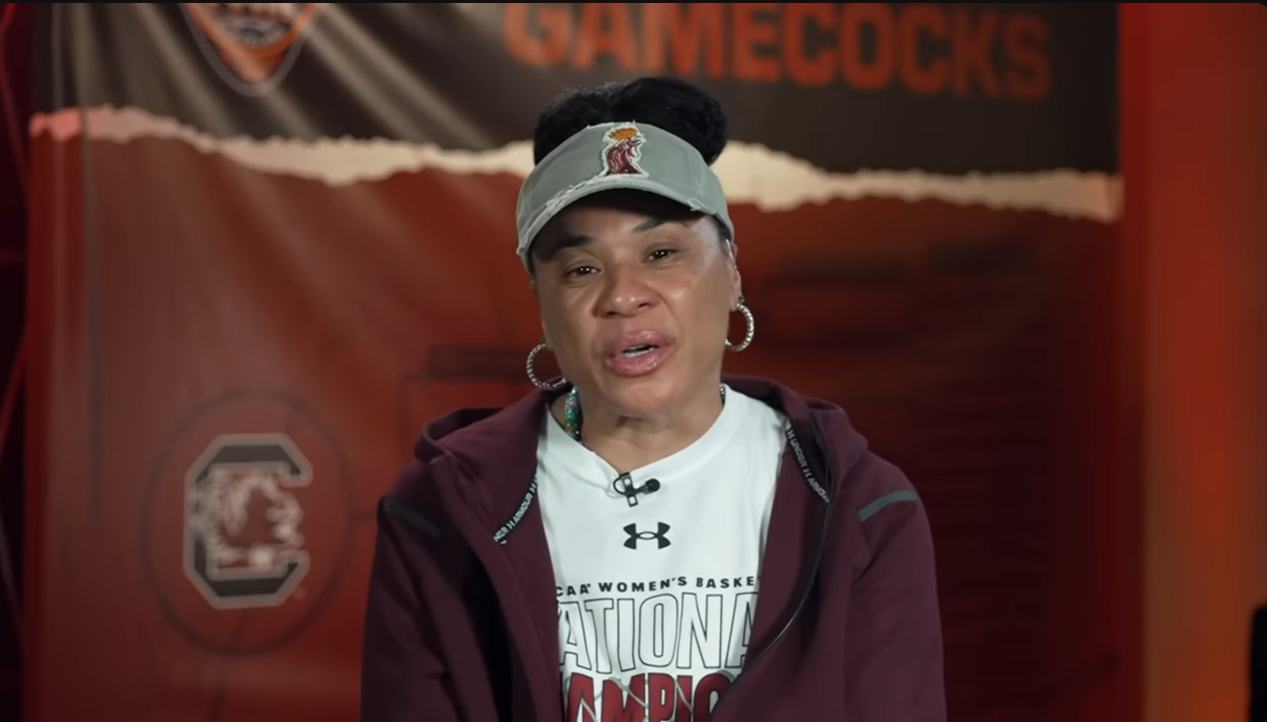
If not for a conservative transphobic blogger, this moment should be a celebration of NCAA women’s basketball coach Dawn Staley and the women of the South Carolina Gamecocks.
On Sunday, they concluded their undefeated season with a decisive win and a championship title. But when Staley faced reporters before that big game, Outkick’s Dan Zakheske asked her an irrelevant, clickbait question about transgender women in sports, referring to them as “biological males.”
Staley could have ignored the question, or stated she had no opinion, but instead the legendary coach offered a crystal clear endorsement of trans women competing in women’s sports, something outlawed in her home state of South Carolina for girls in kindergarten through college.
“I’m of the opinion,” said Staley, “If you’re a woman, you should play. If you consider yourself a woman and you want to play sports or vice versa, you should be able to play. That’s my opinion.”
Zakheske clearly wasn’t satisfied with that declaration of allyship and Staley swiftly cut him off.
“You want me to go deeper?” she asked.
“Do you think transgender women should be able to participate,” he started to say, when the coach stole the ball and took it downtown on a fastbreak. “That’s the question you want to ask? I’ll give you that. Yes. Yes. So, now the barnstormer people are going to flood my timeline and be a distraction to me on one of the biggest days of our game, and I’m okay with that. I really am.”
Staley is herself a Hall of Fame player a leading voice for diversity.
Reaction to her comments were swift, from LGBTQ rights organizations, athletes and inclusion opponents.
“Coach Staley simply spoke the truth that trans women are women and should play if they want,” said Sarah Kate Ellis, president and CEO of GLAAD, in a post on Instagram. “All of us can take a page from Coach Staley’s playbook as a sports leader and as a person of high integrity guided by faith, compassion and common sense.”
A White House pool reporter revealed President Joe Biden called Staley Sunday evening to congratulate her and the Gamecocks on their championship win. But it’s not clear if she and the president, an outspoken supporter of trans rights, discussed her remarks on trans athletes.
A number of Black leaders in the LGBTQ movement applauded Staley for taking a stand.
“Coach Staley has always been a trailblazer, but she’s also shown that true leadership is about advancing justice and equality for everyone,” said Human Rights Campaign President Kelley Robinson. “By expressing her full-throated support for transgender athletes’ inclusion in sports, she’s sending an important message — our shared humanity matters.
“Coach Staley showed courage and vulnerability, in choosing to answer the question and make a powerful statement of support for trans people on one of the biggest days and biggest stages in sports history,” said Kierra Johnson, executive director of the National LGBTQ Task Force, in a statement. “Not only does that make her a leader we can all aspire to like, it makes her a class act. She has etched her legacy in the history books with her play, her coaching, her heart and her smarts.”
In congratulating Staley on her championship title victory, Dr. David J. Johns, the CEO and executive director of the National Black Justice Coalition, also commended her for “her unwavering advocacy and support for transgender people in sports.”
“In a time when transgender athetes face unjust scrutiny, discrimination and exclusion from the National Association of Intercollegiate Athletics, her courage to speak truth to power and in support of inclusion and fairness sets a powerful example for us all, and is a testament to her integrity and compassion.”
The NBJC leader was referring to Monday’s announcement by the NAIA, the governing body of athletic programs at small colleges nationwide, voting 20-0 to essentially ban trans women from competing with other women beginning Aug. 1, as ESPN reported.
“It is a shocking and devastating development that the NAIA, an organization that has done so much to open doors, is now slamming those doors shut on transgender athletes,” said Sasha Buchert, Lambda Legal’s senior attorney and director of the organization’s nonbinary and trans rights project.
“Instead of standing up in support of transgender young people, the NAIA has simply turned its back on them — permanently depriving them of the benefits of competition. Would that they had the courage of victorious University of South Carolina women’s basketball coach Dawn Staley, who didn’t miss a beat in clarifying that transgender women should be able to play.”
However, praise for Staley’s stance was not universal.
Riley Gaines, failed former college swimmer and paid shill for the anti-inclusion organization, Independent Women’s Forum, called Staley “entirely incompetent or a sell-out” on Fox News. “Personally, I don’t think she believes what she said.”
Gaines has turned her fifth-place tie with out trans NCAA champion Lia Thomas into a career as a crusader against inclusion and a former advisor to the presidential campaign of Florida Gov. Ron DeSantis.
Val Whiting, a former Stanford University and professional women’s basketball player, tweeted her strong disagreement with Staley. “A lot of my basketball sisters feel differently but trans women do not belong in women’s sports. It’s not fair nor safe for biological women. There has to be another solution for trans women to be able to compete athletically besides having them compete against biological women.”
A lot of my basketball sisters feel differently but trans women do not belong in women’s sports. It’s not fair nor safe for biological women. There has to be another solution for trans women to be able to compete athletically besides having them compete against biological women.
— Val Whiting (@iamcoachval) April 7, 2024
Zaksheske’s Outkick colleague, anti-trans pundit David Hookstead, also went all-in with a transphobic post.
“Dawn Staley says she supports men who identify as women competing against real women in sports. Her view could literally destroy women’s basketball forever. Why won’t more people stand up for women?”
Dawn Staley says she supports men who identify as women competing against real women in sports.
— David Hookstead (@dhookstead) April 6, 2024
Her view could literally destroy women’s basketball forever.
Why won’t more people stand up for women? pic.twitter.com/2A59KTqvHb
Hookstead then boasted that Staley blocked his account.
Republican South Carolina Congresswoman Nancy Mace retweeted Zaksheske’s account of his interaction with Staley, calling her support of trans athletes “absolute lunacy.” That in turn won praise from Caitlyn Jenner, who retweeted Whiting and posted her thanks to Mace, along with this comment: “There is nothing complicated about this issue!”
What is complicated is that Jenner has never explained why she has competed with cisgender women in golf ever since her transition almost a decade ago.
You’re a hypocrite. pic.twitter.com/42DKwA9jmF
— Art Candee 🍿🥤 (@ArtCandee) April 7, 2024
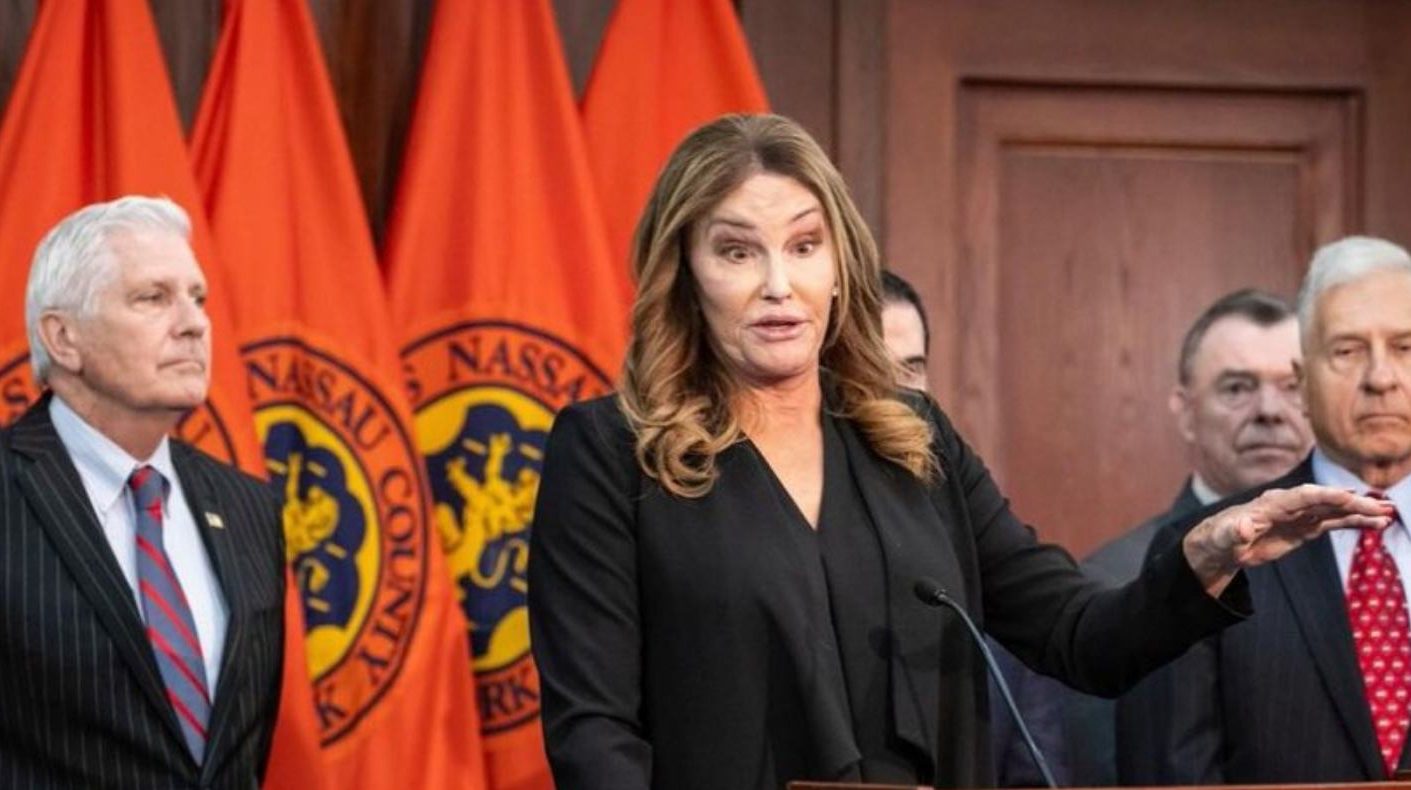
Caitlyn Jenner flew from Malibu to New York this week to join her fellow Republicans in their nationwide quest to keep transgender girls and women from competing in sports with other women.
“Let’s stop it now while we can,” said the Olympic gold medalist, at a news conference carried live by Fox News Channel.
Republican Nassau County Executive Bruce Blakeman organized the event so that Jenner could speak in support of his February executive order banning trans athletes at more than 100 county-owned facilities.
“Trans women are competing against women, taking valuable opportunities for the long-protected class under Title IX and causing physical harm,” said Jenner without providing supportive evidence of her claim. Jenner said the ban would defeat “the woke agenda.”
Her comments drew praise from former NCAA swimmer and paid shill Riley Gaines, who represents the Independent Women’s Forum and has also worked with the failed presidential campaign of Republican Gov. Ron DeSantis of Florida on his anti-trans athlete platform.
We stand with Executive Blakeman as he faces shameful retaliation from @TishJames for merely protecting sports on the basis of sex
— Riley Gaines (@Riley_Gaines_) March 18, 2024
Thanks to you both, @Caitlyn_Jenner @NassauExec !!👏🏼 https://t.co/vAsWfayI7l
“If the left wants to fight this battle on this hill, it’s a losing battle,” said Jenner. “We will win the battle.” She claimed she spoke on behalf of women and girls, contradicting her past statements in support of trans girls competing according to their gender identity and despite the fact she herself still competes in women’s sports.
Shortly after the ban was announced last month, New York State Attorney General Letitia James and New York Gov. Kathy Hochul, both Democrats, denounced it and accused Blakeman of “bullying trans kids.”
James called the order “transphobic and deeply dangerous,” and argued that it violates the state’s anti-discrimination laws. The state attorney general challenged it in court March 1 with a “cease and desist letter,” demanding that Blakeman rescind the order, saying it subjects women’s and girls’ sports teams to “invasive questioning.”
As the Los Angeles Blade reported, Blakeman’s legal team countered with its own lawsuit on March 5, claiming her cease and desist letter violates the 14th Amendment’s equal protection clause.
“Not only was the executive order legal, but we had an obligation to defend it,” Blakeman said Monday.
The order has also been challenged by the New York Civil Liberties Union, which filed suit last week on behalf of a women’s roller derby league based in Nassau County that welcomes trans women and would be barred from using the county’s facilities by Blakeman’s executive order.
Just days before the Long Island news conference, Jenner joined Olympian Sharron Davies, who also campaigns against trans inclusion in sports, for an conversation with a British newspaper, the Telegraph, which has been outspoken against trans inclusion.
They recalled that in their day, tests to determine sex were mandatory in order to compete, and Jenner said she has been “pushing” for sex tests to return to sports, decades after sports organizations around the world abandoned the practice because they were unreliable. “If they continue down this road, it will be pretty much the end of women’s sport as we know it.”
“I can still hit a golf ball 280 yards,” Jenner continued, not mentioning she plays from the ladies’ tee. She did however opine about not being “a real woman,” acknowledging that many trans women disagree with her view.
“They keep saying, ‘Oh, I’m a real woman, I’m a real woman,’ and I’m going, ‘No, you’re not,’” said Jenner. “I will use your preferred pronouns, I will treat you as a female, you can run and dress and do whatever you want, I have nothing against that, it’s fine, but biologically you’re still male.”
She added: “Let me explain — I am biologically male, OK? I’m XY. There’s nothing I can do to change that. If you believe in gender dysphoria, and I think most people do realize it’s not a disease, it’s a mental condition, just like some people are left-handed and some people are right-handed, it’s kind of the way you’re born and I’ve dealt with it my entire life.“
“I consider myself a trans person, I am still genetically male, I changed all of my ID right down to my birth certificate so technically yes, I am female, but on the other hand I know I’m not.”
Related:
-

 Africa4 days ago
Africa4 days agoCongolese lawmaker introduces anti-homosexuality bill
-

 District of Columbia18 hours ago
District of Columbia18 hours agoReenactment of first gay rights picket at White House draws interest of tourists
-

 World4 days ago
World4 days agoOut in the World: LGBTQ news from Europe and Asia
-

 Arizona22 hours ago
Arizona22 hours agoAriz. governor vetoes anti-transgender, Ten Commandments bill



